Retrospective: The Dig
A world away.
I like to take my time. I'm not in any rush. I don't need to be hurried along, pushed from behind, or told time's running out. Let me wander at my own pace, I'll get there in the end. Adventure games let me do that. They're in no hurry. They've a story to tell, and they'll tell it to me in my own good time.
LucasArts' re-emergence from the Star Warsy mire is a beautiful thing to witness, and I couldn't describe it any better than Will Porter did last week while celebrating the chunky fun of Republic Commando.
For me, it's seeing the 15 to 20 year-old point-and-click adventures appearing in Steam's top sellers that warms my heart more than anything else. There is still an audience for these games, and they don't need them to be in 3D with volumetric physics and dynamic downloadable content. Indiana Jones and the Fate of Atlantis has, unsurprisingly, sold the most so far, but for me the game I was drawn to uncover from the archives was The Dig.
Not because I have fond memories of it - I had almost no memories at all. But because when The Dig was released in 1995, it carried the weight of six years of expensive, over-hyped development around its neck, and was played under a cloud of preconceptions and prejudice. Something that time has erased, letting it stand alone, not sold as the trumpeted missing Steven Spielberg project that would change the world as we know it. Um, did I do all that damage again? Forget I said all that. But be assured that the following discusses the whole game, describing events including the ending.
Just in case that wasn't clear: spoilers lie ahead! Be warned!
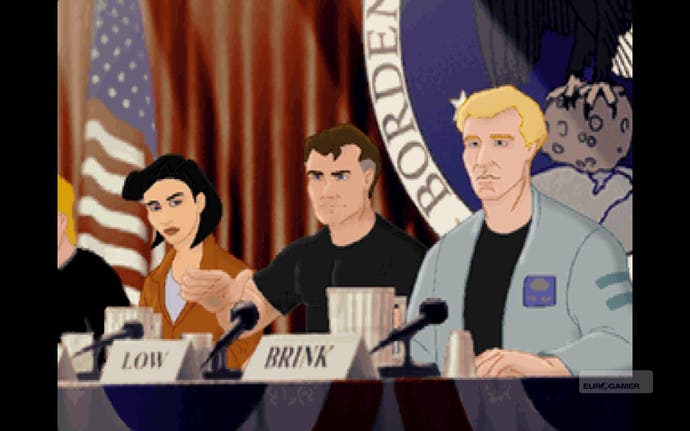
The Dig was indeed based on a Steven Spielberg idea. He gets various credits for story and creation. But this was eventually (after previous aborted incarnations) the project of Sean Clark. Clark was one half of the team, along with Mike Stemmle, who wrote and built Sam & Max: Hit The Road, and programmed for Fate of Atlantis. For The Dig, Clark designed, directed, programmed and wrote dialogue (along with Ender's Game author Orson Scott Card), and I believe remains one of the most unsung heroes of adventure development. Because despite the fractures of a fraught development, and a rather conspicuously rushed ending, The Dig is often brilliant.
An asteroid is hurtling toward Earth, and it's going to collide. Bigger than the meteor that took out the dinosaurs, it has to be stopped at all costs. A team of specialists in specific fields (retired astronaut Boston Low, archaeologist/geologist Dr. Ludger Brink, reporter and linguist Maggie Robbins, political candidate and NASA technician Cora Miles, and shuttle pilot Ken Borden) are sent up to investigate the asteroid, tasked with placing explosives on the rock to force it into orbit around the Earth. If this premise sounds incredibly familiar, it's important to note that the films Armageddon and Deep Impact didn't come out until three years later.
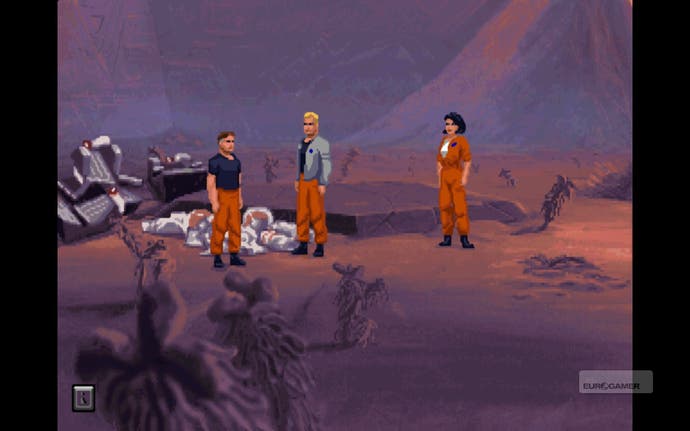
But The Dig has almost nothing else in common with their occasionally bombastic, sentimental cacophony. When it comes to cinematic comparisons, films such as Soderbergh's 2002 remake of Solaris seem much more appropriate, alongside deserved comparisons with Kubrick's 2001. This is a game about the gaps between the noise, the fear in the silence, the danger in the wasteland.
For, once the charges are placed on the asteroid, successfully redirecting it into Earth's orbit ("Earth's new moon"), very quickly it becomes apparent that this is not a random chunk of space rock, but an alien technology. Exploring the surface you take the team of Low, Brink and Robbins through a cavern into a designed, geometric centre, triggering the interstellar spacecraft to take the three of them (leaving Miles and Borden behind), well, somewhere else in space.


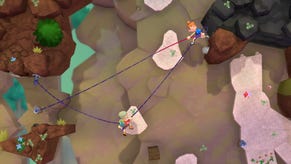



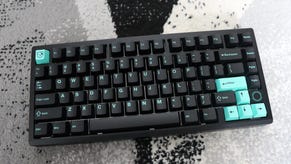

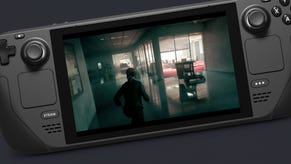
.jpg?width=291&height=164&fit=crop&quality=80&format=jpg&auto=webp)